
Delgamma is a monotypic moth genus of the family Noctuidae erected by Frederic Moore in 1885. Its only species, Delgamma pangonia, the strawberry cutworm, was first described by Achille Guenée in 1852.
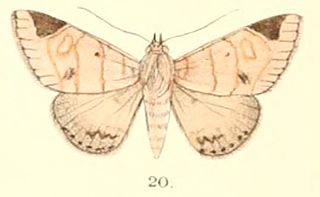
Dordura is a monotypic moth genus of the family Noctuidae erected by Frederic Moore in 1882. Its only species, Dordura aliena, was first described by Francis Walker in 1865. It is found in the Indian subregion, Sri Lanka, Myanmar, Thailand, Peninsular Malaysia, Sumatra, Borneo and New Guinea.
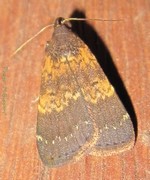
Hydrillodes is a genus of litter moths of the family Erebidae first described by Achille Guenée in 1854. Its validity is somewhat disputed.

Aporandria is a monotypic moth genus in the family Geometridae described by Warren in 1894. Its single species, Aporandria specularia, was first described by Achille Guenée in 1857. It is found in Sri Lanka, India, Vietnam, Thailand, the Andamans, Peninsular Malaysia, Sumatra, Borneo, the Philippines and Sulawesi.

Acronicta pruinosa is a moth of the family Noctuidae. It is found in Sri Lanka, the Himalaya, east to Japan and Taiwan south to Myanmar and Peninsular Malaysia, Borneo, Java and New Guinea.

Ctenoplusia limbirena, the Scar Bank gem, or silver U-tail, is a moth of the family Noctuidae. It is found in south-western Europe, Africa, the Canary Islands, Arabia, the southern Himalayas, India, Sri Lanka, Indochina to south-eastern China, Taiwan, Sulawesi, Bali and Timor. In New Zealand, it has been established since 2011.

Ctenoplusia albostriata, the eastern streaked plusia, is a moth of the family Noctuidae. It is found in India, Sri Lanka, eastern Asia and the Pacific, including Borneo, Hong Kong, Vietnam, Japan, most of Australia and New Zealand.
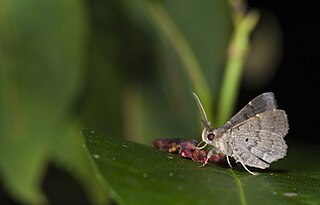
Bocana manifestalis is a moth of the family Erebidae. It was first described by Francis Walker in 1858. It is widespread from India through the Pacific.

Penicillaria jocosatrix, the mango shoot borer, is a moth of the family Euteliidae first described by Achille Guenée in 1852. It is found from southeast Asia to the Pacific. Records include Borneo, Guam, Hawaii, India, Sri Lanka, Thailand and in Australia, Western Australia, the Northern Territory and Queensland.
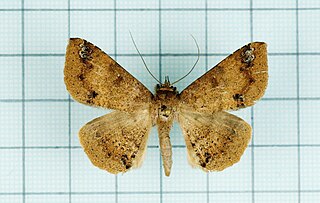
Ericeia inangulata, the sober tabby, is a moth in the family Erebidae. The species was first described by Achille Guenée in 1852. It is found in the Indo-Australian tropics of China, India, Sri Lanka, Myanmar, and the Marianas and Carolines, Fiji, Vanuatu, New Caledonia and Samoa.

Hypena labatalis is a species of moth of the family Erebidae first described by Francis Walker in 1859. It is found in Australia, India and Sri Lanka.
Collix hypospilata is a moth in the family Geometridae. It was described by Achille Guenée in 1857. It is endemic to Sri Lanka.
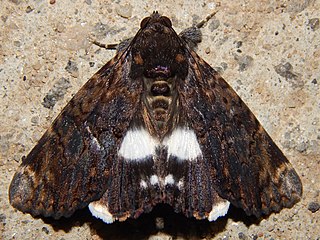
Nagia linteola is a species of moth in the family Erebidae first described by Achille Guenée in 1852. This species occurs in South Africa, the Democratic Republic of the Congo, Yemen, the Comoros, Mauritius, Madagascar, Indonesia (Borneo), India, Sri Lanka, Myanmar, Thailand and in Australia, where it has been recorded from Western Australia, the Northern Territory, Queensland and Victoria.
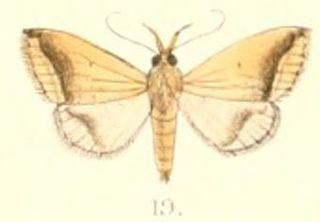
Simplicia mistacalis is a litter moth of the family Erebidae. It was first described by Achille Guenée in 1854 and is found in Asia, from India and Sri Lanka to Taiwan and New Guinea, including China, Myanmar, Japan, the Philippines and Malaysia.

Harita rectilinea is a moth of the family Noctuidae described by Frederic Moore in 1882. It is found in India, Sri Lanka, Myanmar, Peninsular Malaysia and on Sumatra and Borneo.
Sauris hirudinata is a moth of the family Geometridae. It was described by Achille Guenée in 1858. It is found in Fiji, Sri Lanka, India, Hong Kong, as well as on Peninsular Malaysia and Borneo.

Erygia apicalis is a moth of the family Erebidae first described by Achille Guenée in 1852. It is found from the Indo-Australian tropics of India, Sri Lanka to Japan, Australia and the Solomon Islands. The habitat consists of lowland areas, including dry heath forests and softwood plantations.

Erygia spissa is a moth of the family Erebidae first described by Achille Guenée in 1852. It is found from the Indian subcontinent to New Guinea, where it is found in lowland habitats, including heath forests and coastal forests.
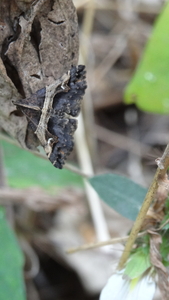
Bertula abjudicalis is a moth of the family Noctuidae first described by Francis Walker in 1859. It is found in India, Thailand, Laos, Vietnam, Taiwan and from Sri Lanka to Australia, where it has been recorded from New South Wales.

Feliniopsis indistans is a moth of the family Noctuidae first described by Achille Guenée in 1852. It is found in India, Sri Lanka, Hong Kong, Japan and Taiwan.

















